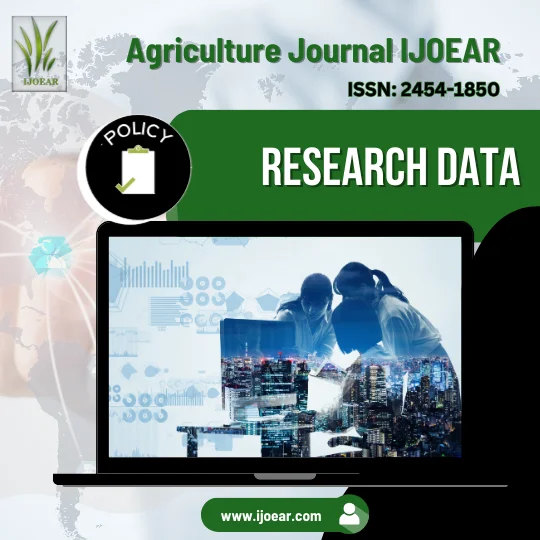 November 2025 Articles
November 2025 Articles Impact Factor: 6.69
Impact Factor: 6.69  Submit Article
Submit Article 
|
Citation Indices
|
All
|
Since 2020
|
|
Citation
|
6164
|
5117
|
|
h-index
|
31
|
29
|
|
i10-index
|
201
|
165
|
|
Acceptance Rate (By Year)
|
|
|
Year
|
Percentage
|
|
2024
|
11.09%
|
|
2023
|
15.23%
|
|
2022
|
12.81%
|
|
2021
|
10.45%
|
|
2020
|
9.6%
|
|
2019
|
14.3%
|
|
2018
|
17.65%
|
|
2017
|
16.9%
|
|
2016
|
22.9%
|
|
2015
|
26.1%
|

The International Journal of Environmental and Agriculture Research (IJOEAR) is committed to upholding the highest standards of research integrity and transparency. This policy outlines our approach to handling research data submitted by authors and sets guidelines for data sharing, storage, and usage.
This policy applies to all authors submitting manuscripts to IJOEAR. It covers all research data generated or analyzed during the study, including:
Sharing research data offers numerous benefits:
IJOEAR encourages data sharing whenever possible, aligning with our mission to promote sustainability and scientific excellence.
Authors must include a Data Availability Statement (DAS) in their manuscripts, clarifying data access. The statement should detail:
Use the following DAS templates as examples:
IJOEAR recommends depositing data in recognized repositories for accessibility and preservation. Examples include:
Select repositories aligned with FAIR principles (Findable, Accessible, Interoperable, and Reusable).
IJOEAR encourages making research data publicly available whenever ethically and legally permissible. To support this:
IJOEAR prioritizes ethical and legal rights. Authors must ensure:
IJOEAR may reject manuscripts with ethical concerns or non-compliance.
Proper data acknowledgment is crucial. Cite data sources in your manuscripts as follows:
Follow IJOEAR's referencing style as detailed in the Author Guidelines.
Authors must ensure the security and longevity of their research data. Here are some recommendations:
For long-term preservation, consider using repositories that guarantee data storage for a minimum of 10 years. These repositories ensure data accessibility even if the original storage media degrades over time.
Complying with IJOEAR's Research Data Policy offers several advantages for authors:
IJOEAR is committed to safeguarding the integrity of research data published on our platform. We take any misuse of data seriously. If you encounter potential data misuse or disputes, please report them to our editorial board at support@ijoear.com. We will promptly investigate the issue and take necessary actions, which may include article retraction or other measures.
By implementing this Research Data Policy, IJOEAR aligns with global open science initiatives. We believe that fostering data transparency will contribute to:
For any questions regarding the Research Data Policy or data submission process, please don't hesitate to contact our editorial team at info.ijoear@gmail.com or info @ijoear.com.com . We are here to assist you.